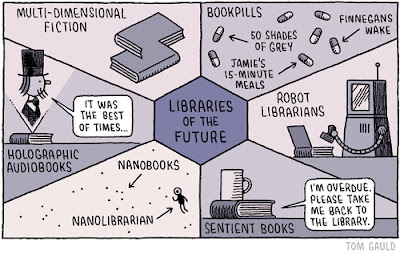It has been just over a year since I started this blog. The core idea was to examine the phenomenon of digital technology gradually replacing the physical objects it is based on, concentrating especially on ebooks. How's it all going?
I still don't have a Kindle, but I did try out the Kindle app on my late smartphone (broke in a moment of frustration and abandoned). I downloaded 'Ulysess' and read bits of it at work in spare moments, but then I started playing online chess on my phone again and stopped reading Ulysees. It was fun for a while, and also it's looks slightly less lazy if you're sitting in the staff room looking at your phone. If you've got a large book in your lap, you might as well have your feet up.
Max, the French boy at work, has a Kindle. He brings it in to work to read in spare moments. He has read all the Game of Thrones books on it. I suppose it's handy because he can easily get French language books. I wonder whether the flour of the bakery will affect the Kindle, but then they do seem like very robust things, surprisingly close to imitating non-computers.
Though I don't want a Kindle and still regularly read physical books, I'm considering publishing a novella I have written as an ebook. It's so easy. You just upload it to Amazon with a picture and there it is: anyone can buy it and read it. I have misgivings, one of which is the fact that Amazon don't pay enough taxes and I've been trying to avoid them. It's certainly not the ultimate dream of getting published, but it might be a way to get there. Perhaps one must embrace technology wholeheartedly or not at all.





